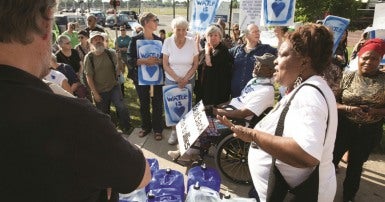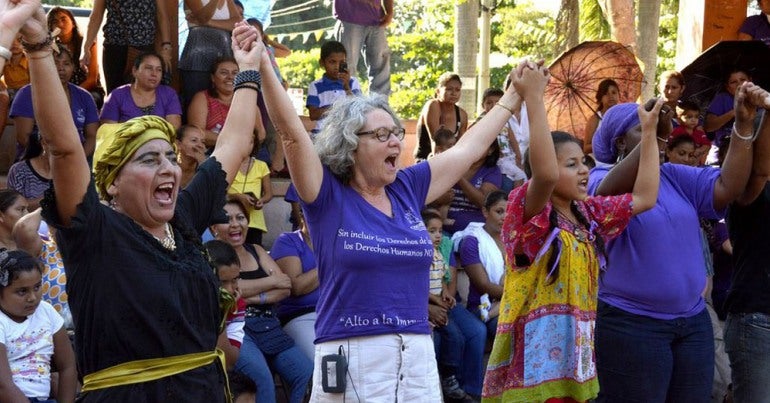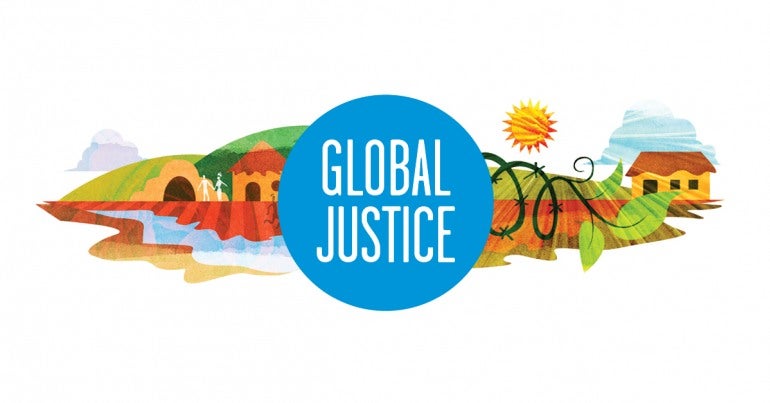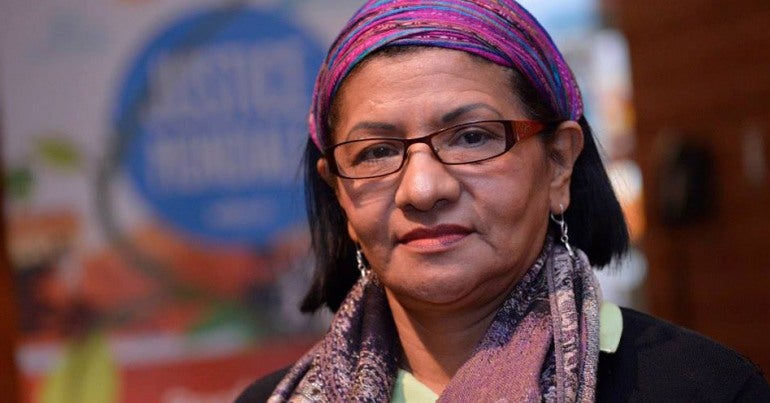
KAIROS LEARNING TOUR PHILIPPINES
In response to an appeal from Indigenous and non-Indigenous communities in Zamboanga del Sur in southern Philippines, CUPE participated in a Philippines Learning Tour to the region in July 2014. CUPE 3550 member and NEB Alternate Diversity Vice President (Aboriginal) Gloria Lepine joined the Canadian delegation to visit with Indigenous and non-Indigenous mining affected communities. The Canadian mine TVI Pacific is operating in the region.
The delegation called on the Philippine government and the National Commission on Indigenous Peoples to be accountable for mining laws and policies that leave the environment vulnerable to massive plunder and irreversible destruction. They also called on the Canadian government to ensure that Canadian companies operating overseas act in a way that respects and upholds human rights and does not damage the environment.
The Learning Tour was coordinated by KAIROS a social justice organization of eleven churches and religious organizations, in partnership with a Philippine delegation of church workers, missionaries, Indigenous people and students coming from the region. Mining Watch Canada, and Idle No More also participated in the tour.
 WATER CARAVAN TO DETROIT
WATER CARAVAN TO DETROIT
One thousand litres of public water were greeted with cheers in Detroit in July 2014, where over 120,000 citizens were locked in a water and human rights crisis.
CUPE National President Paul Moist joined Council of Canadians National Chairperson Maude Barlow in a convoy from Windsor to Detroit to deliver water as a show of support and solidarity with the people of Detroit who had their water cut-off.
The Detroit Water and Sewage Department started cutting off water in April to residents behind in payment of their bills. This affected over 15,000 homes. The financially troubled city has declared bankruptcy, and many have fled for the suburbs or other cities, greatly diminishing the tax-base and leaving much of the public infrastructure – such as the water and wastewater system – in disrepair. Those who have remained in Detroit, mostly African-American and low-income earners, have seen utility rates rise over 119 per cent in the last decade.
Solidarity with our American friends
CUPE National President Paul Moist brought greetings to our American sister union, AFSCME, at its convention in July 2014. AFSCME is the largest AFL-CIO affiliated union, representing over 1.6 million public sector workers across the US. Over 3,000 delegates gathered in Chicago for the convention. AFSCME and CUPE have been sharing information and working together on member engagement, pension issues and fighting privatization.
Peace in the region cannot be achieved unless there is an end to all aggression on both sides, an end to the blockade against Gaza and an end to the illegal occupations of the Palestinian territories by Israel.
RECOGNITION OF HUMAN RIGHTS AND INTERNATIONAL HUMANITARIAN LAW IN GAZA
In August 2014, the world watched in horror as violence and destruction left nearly 1,900 people in Palestine and 67 people in Israel dead. Ban Ki-moon, secretary-general of the UN, said, “the massive deaths and destruction in Gaza have shocked and shamed the world.”
CUPE called on the Canadian government to recognize the need for human rights and international law to be respected and to call for an end to the unjust and disproportionate violence inflicted on the people of Gaza by Israel.
CUPE joined workers around the world in providing urgent humanitarian assistance to the people of Gaza through the humanitarian relief initiative launched by the International Transport Workers’ Federation and supported by the International Trade Union Confederation.
Civilians in Gaza were wounded and killed while under occupation and siege. While under bombardment, people were trapped without safe refuge, and without access to lifesaving support such as medical supplies, electricity and clean water.
CUPE’s position is that peace in the region cannot be achieved unless there is an end to all aggression on both sides, an end to the blockade against Gaza and an end to the illegal occupations of the Palestinian territories by Israel.
EBOLA
The World Health Organization (WHO) says that despite a significant drop in the numbers of people currently being infected, the outbreak of the Ebola Virus Disease (EVD) continued to be a global emergency in 2015.
This outbreak revealed the structural and systemic weaknesses of the health systems of Guinea, Sierra Leone and Liberia. Investment in the public sector health system over the past few decades, particularly following the civil conflicts in Liberia and Sierra Leone, would have dramatically reduced the consequences of this outbreak. Hundreds of lives could have been saved. Addressing the structural and long-term political problems such as the lack of funding for the public sector health system, the lack of decent working conditions and labour rights, inadequate universal health coverage are the focus of the local and global trade union movement.
CUPE supports the PSI Ebola Virus Disease Trade Union Intervention Strategy to address the need to lobby for proper staffing and training of health workers in West Africa, to campaign for better health and safety conditions for workers and to promote the rebuilding and extension of public health systems throughout the region.






